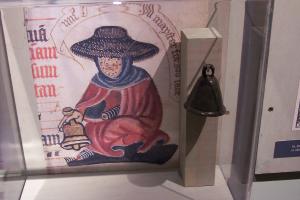 Last week I lamented about the lack of literary skill on display in the two books of Kings, so heavily influenced as they are by the ideological straight jacket of the Deuteronomic “historian.” I place the word “historian” in quotation marks advisedly, for to use such a word in the context of such obvious ideological biases is to stretch its usual meanings to the breaking point. This fierce editor was in effect not writing history so much as a record of events strained through a narrowly gauged sieve. However, on occasion the sieve is loosened and the wonder of a memorable story is allowed to shine forth. Surely, 2 Kings 5 is one of those times, and it is a superb example of a talented narrator’s art.
Last week I lamented about the lack of literary skill on display in the two books of Kings, so heavily influenced as they are by the ideological straight jacket of the Deuteronomic “historian.” I place the word “historian” in quotation marks advisedly, for to use such a word in the context of such obvious ideological biases is to stretch its usual meanings to the breaking point. This fierce editor was in effect not writing history so much as a record of events strained through a narrowly gauged sieve. However, on occasion the sieve is loosened and the wonder of a memorable story is allowed to shine forth. Surely, 2 Kings 5 is one of those times, and it is a superb example of a talented narrator’s art.
In the venerable Anchor Bible Dictionary, a fixture on my desktop (not my computer’s desktop, but my actual desktop), T.R Hobbs, in an otherwise valuable brief summary of the story, writing in his article on General Naaman (vol.4, pp. 967-968) describes the tenor of the story as “ a comedy of manners, almost bordering on farce.” I grant there is a good bit of humor in the telling, but I quite strenuously disagree that this is farce. After all synonyms of farce include “ludicrous, laughable, nonsensical, silly, preposterous, absurd” among other risible words. Farce conjures Lucille Ball and Red Skelton, if any of you are old enough to remember these ancient funny people. Or how about the British Benny Hill or John Cleese (still very much with us) and Fawlty Towers?
If we might include in the word farce the element of delightful surprise, then perhaps the word is not completely off the mark. What one surely finds in this tale is powerful people whose power finally means nothing, and tiny, powerless people who turn out to be conduits of YHWH’s will. If that be farce, then it is playful and fun and wonderfully surprising. In short, I would suggest that this story is a superb microcosm of the Bible’s greatest gift to its readers, teachers and preachers, namely its constant element of graceful surprise. YHWH is primarily in the business of surprise, as is Jesus in the New Testament when he spins his unforgettable literary parables of pig-smelling boys, equal pay for all, ever-demanding widows, and the gift of a penny outstripping the lavish offerings of the rich. YHWH’s love of surprise is revealed again and again with 100-year old fathers and mothers, the survival of a hero due to women only in a patriarchal world, a chosen king who murders his way to the throne and even demands another murder as he lies dying—a dark surprise indeed!
The surprises of 2 Kings 5 come thick and fast. The tale begins with a man of power, General Naaman of the formidable nation of Syria, a constant thorn in the side of its neighbors, including Israel, for several centuries. Naaman may have great authority, but unfortunately he has a skin disease that is somehow debilitating to him. It is hardly Hansen’s disease, that terrible scourge that leads to an unsightly countenance, ending finally in the loss of digits. That disease apparently afflicted the Judean king, Uzziah, forcing him to name a co-regent during his reign. Naaman’s disease may be unsightly, but it does not prevent him from acting his role of general over the army. Still, it does cause the great man enough discomfort and embarrassment that he wishes he could find a cure.
The first surprise of the story is the possible source of that cure. During one of Syria’s countless raids on Israel to the west, an unnamed girl is captured and is given to Naaman’s wife as a slave, no doubt one slave among many. But this girl has access to knowledge that no one else in Syria possesses. She knows of a man of awesome power in Israel who could easily and readily cure the great general of his leprosy. This man is the “prophet in Samaria,” and we know him to be the redoubtable Elisha. The wife shares this potentially happy news with her husband, but instead of going straightaway to Israel on his own, the general knows all too well that such forays into enemy territory are not to be undertaken lightly. After all, Syria and Israel were at war for decades, if not centuries, and power politics demands care when it comes to asking for help from one’s foe.
So, Naaman first goes to his king to follow the appropriate protocols. The Syrian king immediately writes a letter to the Israelite king (both unnamed in the tale), saying, “When this letter reaches you, know that I have sent to you my servant Naaman, that you may cure him of his leprosy” (2 kings 5:6). The letter seems straightforward enough; here is my servant, he is ill, please cure him. But when kings read letters from other kings, they must carefully parse the prose, sensing that beneath the request lie hidden demands and dangerous implications. Upon reading the Syrian’s letter, the Israelite king immediately tears his clothes in horror and shouts, “Am I God, to give death or life, that this man (note, not the king) sends word to me to cure a man (note, not a servant or general) of his leprosy? Look! He is trying to pick a fight with me” (2 Kings 5:7)! A simple and apparently quite solicitous request for healing has become in the hands of a terrified king the cause of a possible war! The men of power, all three of them, have made a mess of things, and the two nations, ever seeking reasons for conflict rather than peace, are poised once again for battle.
The prophet Elisha hears of the king’s precipitous reaction to the letter, and calmly suggests, “Let him come to me that he may learn there is a prophet in Israel” (2 Kings 5:8). So, Naaman, accompanied by a vast retinue of horses and chariots, along with enormous wagons laden with silver, heads to the country residence of the prophet, fully expecting an appropriate welcome for his obvious grandeur and importance. Instead, a servant appears to the general and tells him summarily to go down to the Jordan, that muddy creek, and dip his body into it seven times, and his leprosy will disappear. Of course, the great Naaman is furious! Surely, any self-respecting prophet, when confronted with a superior being like Naaman, would deal with the problem himself, wave his arms about in dramatic display of his powers. He certainly would not send a pathetic servant out to do his work, nor would he demand that he bathe his glorious body in the disgusting Jordan. Why, there are far better rivers in Syria, Abana and Pharpar, for example, that would be far cleaner, far more efficacious, than this Jordan! I will not do such a thing! And with that, Naaman turns his huge caravan around and heads for home.
Once again servants intervene to direct the scene. “Father, (they cajole the man with a term of endearment), if the prophet had commanded you to do something difficult, would you not have done it? How much more, when all he said was ‘Wash and be clean?’” (2 Kings 5:13). Naaman puts away his wounded pride, dips in the Jordan and immediately is cured of his leprosy. Being cured, he goes back to Elisha and announces, “Now I know that there is no God in all the earth except in Israel; please accept a present from your servant” (2 Kings 5:15). But Elisha stoutly refuses any gift. Then Naaman asks if he might take a load of Israelite dirt back with him to Syria, for when he worships the god Rimmon, as he must do as general, he will see the dirt and remember YHWH who cured him. Obviously, the mighty Naaman is hedging his religious bets, despite his public claim that there is really no God except the Israelite one, and asks Elisha to forgive him for this clear religious syncretism. “Go in peace,” mutters the prophet, perhaps somewhat enigmatically. Is this “shalom” one that approves of Naaman’s request to continue to honor a foreign deity along with YHWH, or does it mean rather “Do what you think you must do,” offering neither approval nor condemnation? I rather think that the latter is closer to the author’s intent.
Well, servants at the last run this story, the Israelite slave girl, the slave of Elisha, and the slaves/servants of the great general. The surprise of the story is palpable, as the mighty men in the tale make a hash of the situation, only to be rescued by the unlikely servants. So it is with the surprising God of the Bible; one just never knows who will carry the word of God for a hurting world. In Luke’s account of the birth of Jesus in his chapter 2, the great story begins with a mention of Caesar, ruler of the known world, and goes on to name Quirinius, the Syrian governor, known only to us because of this story, and finally ends with an unknown unmarried peasant woman, heavily pregnant, and about to bear the Messiah. The surprises of God seem never to end!
(images from Wikimedia Commons)











